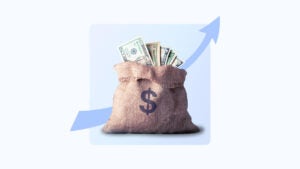Best small business loans for under $5,000

Key takeaways
- Small business owners can use business loans for under $5,000 to cover various business-related expenses
- SBA microlenders may offer accessible loan amounts as low as $500
- SBA microlenders and alternative lenders may offer accessible business loans for under $5,000 even to business owners with bad credit
Small business loans can cover various business-related expenses like inventory, cashflow gaps and emergencies. But not all lenders offer business loans for $5,000 or less.
If you’re a small business owner who only needs a small amount of financing, your best options may be microlenders or alternative lenders that offer term loans and business lines of credit with low starting loan amounts. These lenders may even have relaxed eligibility requirements to help business owners with credit scores of 500 or lower.
Below are seven of the top lenders that offer small business loans for under $5,000 along with their eligibility requirements and even a few alternative options worth considering.
Best small business loans under $5,000
| Lender | Best for | Loan amounts | Bankrate score |
|---|---|---|---|
| SBA microloan | Underserved communities | $500 to $50,000 | N/A |
| Kiva | Best for interest-free microloans | $1,000 to $15,000 | 4.3 |
| American Express® Business Line of Credit* | Best for working capital | $2,000 to $250,000 | 4.3 |
| Lendio | Best for bad credit microloans | $1,000 to $5 million | 4.6 |
| Taycor Financial | Best for equipment loans | $500 to $5 million | 4.2 |
| Fundbox | Best for short-term business lines of credit | $1,000 to $150,000 | 4.5 |
| PayPal | Best for PayPal business accounts | $1,000 to $250,000 | 4.2 |
*American Express® Business Line of Credit offers two loan types, installment loans and single repayment loans for eligible borrowers. All loan term types, loan term lengths, and pricing are subject to eligibility requirements, application, and final approval. This [content / article] contains general information about the American Express® Business Line of Credit installment loan type only.
SBA microloans: Best for underserved communities
SBA microloans are small loans guaranteed by the Small Business Administration, which approves loan amounts of up to $50,000. They’re offered through nonprofit lenders on a mission to serve business owners traditionally underserved in business lending. These include minority business owners, women, veterans — even immigrants and refugees.
SBA microlenders set their own business loan requirements to approve the loans but are more lenient than traditional lenders. For example, Accompany Capital microloans start as low as $500. There is no credit score requirement, and the lender offers fixed low interest rates of 8.00 percent to business owners located in the five boroughs of New York City.
To help you quickly find a participating SBA microlender near you, the SBA has a list of microlenders.
-
Lending requirements for SBA loans can vary, especially for microloans. Microlenders may require:
- Minimum credit score in the 500s
- Startups may be eligible
- Located in the lender’s state or city
- Collateral or personal guarantee required
- Business plan
Kiva microloans: Best for interest-free microloans
Kiva blends the best of crowdfunding, peer-to-peer and nonprofit lending together, offering a unique 0-percent-interest microloan. You can get loan amounts up to $15,000, and you won’t pay any loan fees. Kiva microloans don’t require a credit check or business revenue, which is helpful for business owners with bad credit and startups.
The main catch is that you’ll need to raise loan funding through your personal network first. Then, you go public on the platform to let other investors fund the rest. Because of the lenient requirements, this microloan works well if you’ve had a business loan denied by other lenders.
-
- Over 18 years old
- Must use the loan for business expenses
- Cannot be used to refinance debt or buy stock or equity
- Have no current foreclosures, bankruptcy or current liens
American Express® Business Line of Credit: Best for working capital
The American Express® Business Line of Credit provides loans from $2,000 to $250,000. You’ll need a minimum FICO score of at least 660* at the time of application to qualify. You’ll also need an average monthly revenue of at least $3,000, which is low compared to many other lenders.
This business line of credit can help cover nearly any working capital expense.
* All businesses are unique and are subject to approval and review. The required FICO score may be higher based on your relationship with American Express, credit history, and other factors.
-
- Must be at least 18 years of age
- Minimum FICO score of at least 660* at the time of application
- Need to have started your business at least a year ago
- Average monthly revenue of at least $3,000
* All businesses are unique and are subject to approval and review.
Lendio: Best for bad credit microloans
Lendio connects small business owners to its extensive network of 75 business lenders. Loan amounts for its business line of credit start at $1,000. There are even loan options for business owners who need business loans for bad credit.
You just need a minimum credit score of 560 to apply for a Lendio business line of credit, and there’s no credit requirement for a merchant cash advance.
-
- 6 months to 2 years in business, depending on loan
- $50,000 in annual revenue
- Minimum personal credit score between 560 and 680
Taycor Financial: Best for equipment loans
A microloan can help cover equipment costs, including computers, office furniture or tools. But not all lenders offer equipment financing with low starting loan amounts. Taycor Financial offers equipment loans from $500 to $5 million with favorable payment terms that stretch up to seven years. Once you apply, your prequalification lasts up to 90 days — giving ample time to research the right equipment for your business.
You can even fund up to 100 percent of the equipment cost, meaning no down payment. Then, choose the payment schedule that best fits your budget: monthly, quarterly or semi-annually. Taycor Financial also provides equipment leasing or refinancing if you need those options instead.
-
- 3 years in business, though some startups accepted
- Minimum personal credit score of 550
- Minimum Paynet business credit score of 600
- No minimum revenue for loans under $250,000
- May require bank balance of at least 5% of equipment cost
- May require a personal guarantee
Fundbox: Best for short-term business lines of credit
Fundbox offers accessible credit limits as low as $1,000 and up to $150,000. Its specialty is its small business line of credit. These are short-term business loans with quick repayment periods of 12 and 24 weeks. But paying your loan off quickly will cut down on the weekly fees Fundbox charges, and there’s no prepayment penalty if you want to pay your debt off early. Plus, you avoid the fee it charges each week you have an outstanding balance against your credit.
-
- At least 6 months in business
- Minimum personal credit score of 600
- At least $100,000 in annual revenue
- Business checking account opened for at least 3 months
PayPal: Best for PayPal business accounts
PayPal lends a helping hand to small businesses through relaxed loan requirements — as long as you have a PayPal business account. For its short-term business loan, you need the account to receive the loan funds once it’s approved.
For PayPal working capital loans, the lender considers the amount of PayPal sales you process. You need at least $15,000 in sales through your PayPal Business account to qualify and $20,000 through a Premiere account to qualify.
-
PayPal business loans
- Minimum personal credit score of 580
- At least 9 months in business
- At least $33,300
- No minimum personal credit score
- At least $15,000 in PayPal sales
- Must have PayPal business account for 90 days
Pros and cons of small business loans under $5,000
The best small business loans will keep requirements accessible while providing favorable terms and payment schedules for your business. Let’s dive into the benefits and downsides of getting a microloan.
Pros of small business loans under $5,000
- Relaxed requirements. Lenders offering microloans tend to work with small businesses that may get edged out of traditional business loans. They may offer startup business loans or business loans for bad credit.
- Fast funding. Most lenders can approve small loan amounts quickly since they pose less risk to the lender.
- Unique features. Lenders with accessibly low loan sizes may offer standout features to help small businesses. The exact features will be different, but they could be community support, a long prequalification period or no prepayment penalty.
- May not require collateral. Since it’s easier to prove that you can repay a small business loan, you could get an unsecured business loan. This means that you could qualify even if you don’t have significant assets.
Cons of small business loans under $5,000
- Short repayment terms. Lenders may not offer long terms for microloans for small businesses. You may only find yourself with short terms of up to 24 months.
- Potentially high costs. Microloans could come with high interest rates, steep origination fees or other loan fees to offset the risks of the lender approving high-risk businesses. For example, some microlenders may charge closing fees at a percentage of the loan cost.
- Limited lender or loan options. Not all lenders offer small business loans under $5,000, and microlenders may be hard to find. The most common business loan that offers this loan size is a business line of credit.
Alternatives to business loans under $5,000
You may decide that getting a business loan under $5,000 isn’t practical for your business. If so, you could try one of these alternatives to business loans:
Business credit cards
You could consider a business credit card an entry-level business loan. They typically require strong credit like a personal credit score of 680 and up. They work well for sole proprietors since you can apply for one even without forming an official business.
Even the best business credit cards are short-term options meant to help cover working capital expenses or cash shortages. As long as you pay off the entire balance each month, you won’t pay any interest, similar to getting a zero-interest business loan.
You don’t have to use a business credit card to build business credit. While you can avoid interest charges when you take advantage of the card’s grace period, even holding on to the card and avoiding negative marks can help you grow your credit score.
Business grants
Business grants are a form of financing that you don’t have to pay back. But you will have to work to get awarded the grant. You can start by researching grants with qualifications that you meet, such as working in a certain industry or being part of a disadvantaged community.
Application requirements may be comprehensive, such as requiring an in-depth business plan. Once you apply, you’ll then have to be patient since the grant organization could take weeks to sift through all the applicants.
Crowdfunding
Crowdfunding helps you raise money through a pool of individual investors, either as donations or by giving rewards or equity into your business. Crowdfunding also helps generate excitement and get feedback about your business as you propose your business idea to investors. You can find a variety of crowdfunding platforms like Kiva or Kickstarter, each with its own rules and guidelines for using them.
Bottom line
While banks can provide loans in small sizes, most microlending happens through alternative lenders. These lenders tend to keep lenient lending requirements to help businesses that usually have a hard time getting business financing. But the features of a microloan, like short payment terms, won’t work for every business or funding need. To compare lenders, pinpoint exactly what you need ahead of time, such as few fees or the ability to draw from the credit again.
Frequently asked questions
-
Microlending is the action of lending small amounts of money to businesses. Compared to traditional loans from banks, microloans tend to be more accessible options for startups and business owners with bad credit. Popular options include SBA microloans and Kiva.
-
No, microlenders often accept bad credit or don’t have any credit requirements at all. Microloans typically serve disadvantaged businesses. In 2022, the SBA reports 76 percent of SBA microloans went to underserved communities.
-
Banks may offer small business loans under $5,000, especially for business lines of credit. But loan amounts vary by lender. Large banks like Bank of America and PNC Bank can have high starting loan amounts ranging from $10,000 to $20,000. Local community banks may be more willing to offer microloans to small businesses.
-
Microloans for small businesses can require collateral, signing a personal guarantee or getting a co-signer. The lender evaluates whether you need these guarantees based on your business’s financial health. It also depends on the lender’s tolerance for accepting the risk of loan default.
Why we ask for feedback Your feedback helps us improve our content and services. It takes less than a minute to complete.
Your responses are anonymous and will only be used for improving our website.
You may also like

Best low-interest business loans for bad credit

The best business loans for a 500 credit score

How to get a business loan with no money

How to get a small business loan when self employed


